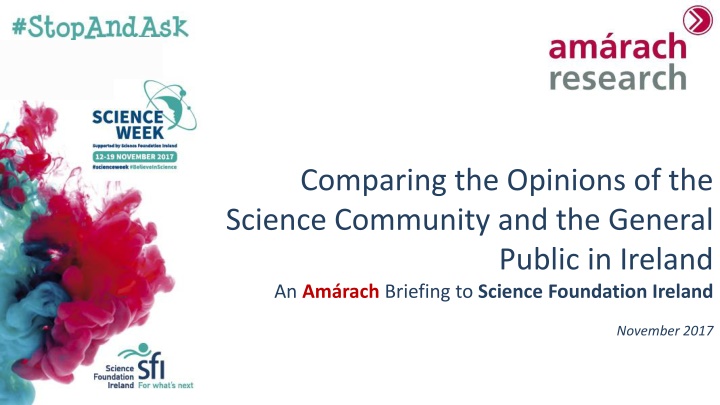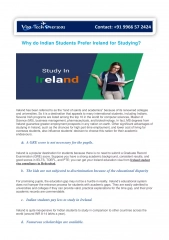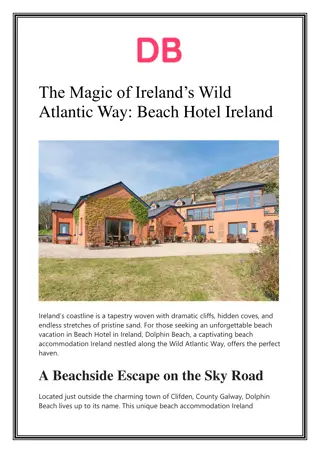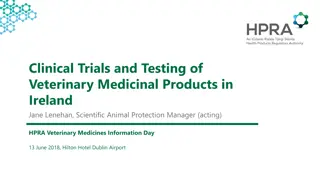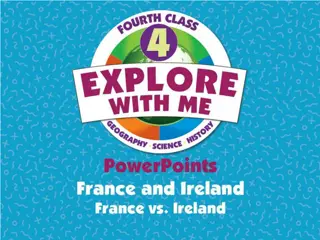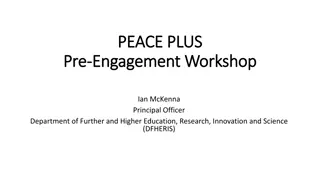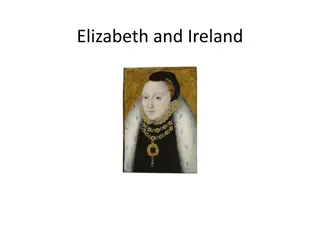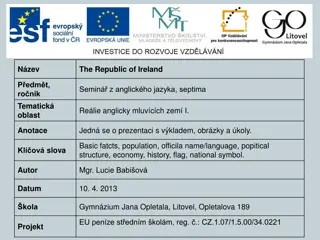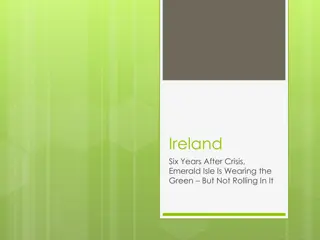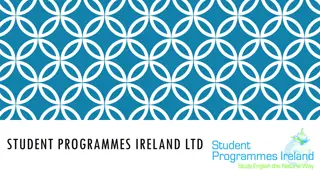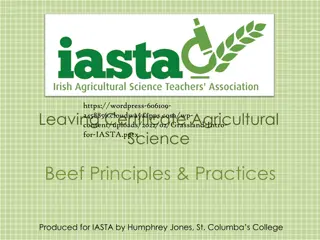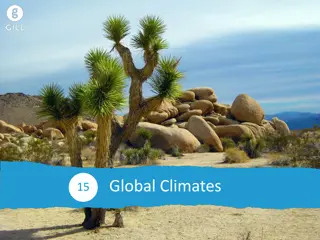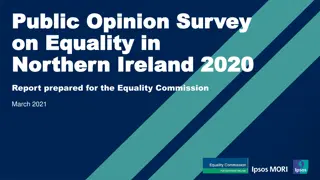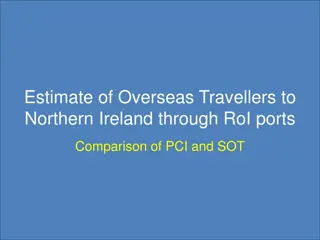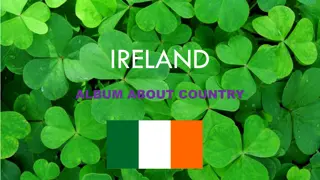Contrasting Views on Science in Ireland: Science Community vs. General Public
Science Foundation Ireland conducted research in 2017 to compare the opinions of the general public and the science community in Ireland on various topics like the impact of science, climate change, medicine, evolution, and more. The study revealed differing views on the positive impact of science, climate change causes, and beliefs regarding different aspects of life. The presentation highlighted these disparities and similarities, shedding light on the perceptions of both groups.
Download Presentation

Please find below an Image/Link to download the presentation.
The content on the website is provided AS IS for your information and personal use only. It may not be sold, licensed, or shared on other websites without obtaining consent from the author.If you encounter any issues during the download, it is possible that the publisher has removed the file from their server.
You are allowed to download the files provided on this website for personal or commercial use, subject to the condition that they are used lawfully. All files are the property of their respective owners.
The content on the website is provided AS IS for your information and personal use only. It may not be sold, licensed, or shared on other websites without obtaining consent from the author.
E N D
Presentation Transcript
Comparing the Opinions of the Science Community and the General Public in Ireland An Am rach Briefing to Science Foundation Ireland November 2017
Presentation Structure Background & Methodology SECTION 1: The Impact of Science SECTION 2: Climate Change & Natural Resources SECTION 3: Medicine & Food SECTION 4: Evolution & The Big Bang SECTION 5: The Role of Science SECTION 6: Scientists & Scientific Achievements Awareness SECTION 7: Comparing Ireland Internationally
Background & Methodology In advance of Science Week 2017, Science Foundation Ireland sought to conduct research to measure and compare the opinions of the general public and the science community in Ireland. Questions were asked across a range of subject including the impact of science on everyday life, climate change and evolution, amongst others. The research format was based on the Pew Research Centre, a non-partisan think tank that informs the public about the issues, attitudes and trends shaping the world. The objective of the research was to uncover any differences and/ or similarities in the views and perceptions of the general public and Irish scientists on issues relating to science and everyday life. A national online survey of 1,000 adults* was conducted between 13th 17th October, while 238 members of the science community were surveyed online, via an email link sent to researchers working in academia and industry by Science Foundation Ireland. *referred to as general public throughout
Q.1 Science has had a positive impact on peoples lives in Ireland. 67% 41% 28% 23% 22% 8% 5% 3% 3% 0% Strongly Disagree Disagree Neutral Agree Strongly Agree Public Science Community Public 1,001 Scientists - 239
Public Vs. Science Community % who believe science has had a positive impact on Healthcare Food The Environment Education 96% 85% 87% 79% 61% 67% 65% 71% Transport Quality of Life Family Life 83% 65% 51% 47% 56% 62% Public 1,001 Scientists - 239
Q.3 Climate change is mostly due to human activity... 59% 36% 33% 32% 19% 8% 6% 5% 1% 1% Strongly Disagree Disagree Neutral Agree Strongly Agree Public Science Community Public 1,001 Scientists - 239
Q.3 The earth is getting warmer as a result of climate change 64% 38% 31% 28% 23% 7% 5% 3% 1% 0% Strongly Disagree Disagree Neutral Agree Strongly Agree Public Science Community Public 1,001 Scientists - 239
Q.3 There is broad agreement within the science community about the causes of climate change 53% 36% 36% 31% 20% 10% 5% 5% 3% 1% Strongly Disagree Disagree Neutral Agree Strongly Agree Public Science Community Public 1,001 Scientists - 239
Q.3 The growing world population will put a strain on natural resources 69% 39% 37% 23% 16% 5% 4% 3% 3% 1% Strongly Disagree Disagree Neutral Agree Strongly Agree Public Science Community Public 1,001 Scientists - 239
Q.3 The planets resources will sufficiently be able to deal with a growing population 39% 34% 28% 26% 19% 18% 14% 14% 5% 3% Strongly Disagree Disagree Neutral Agree Strongly Agree Public Science Community Public 1,001 Scientists - 239
Q.3 Wind turbine farms are an acceptable form of energy 55% 40% 36% 32% 20% 6% 4% 4% 3% 0% Strongly Disagree Disagree Neutral Agree Strongly Agree Public Science Community Public 1,001 Scientists - 239
Q.4 It is safe to eat genetically modified foods 35% 34% 28% 24% 24% 19% 17% 10% 5% 4% Strongly Disagree Disagree Neutral Agree Strongly Agree Public Science Community Public 1,001 Scientists - 239
Q.4 It is safe to eat foods with pesticides 32% 31% 28% 28% 23% 22% 15% 12% 6% 3% Strongly Disagree Disagree Neutral Agree Strongly Agree Public Science Community Public 1,001 Scientists - 239
Q.4 Vaccinations are an acceptable form of preventative medical treatment 77% 40% 24% 24% 18% 7% 5% 4% 1% 0% Strongly Disagree Disagree Neutral Agree Strongly Agree Public Science Community Public 1,001 Scientists - 239
Q.4 I would support the bioengineering of artificial organs for use in transplants 60% 38% 31% 30% 18% 8% 7% 6% 1% 1% Strongly Disagree Disagree Neutral Agree Strongly Agree Public Science Community Public 1,001 Scientists - 239
Q.5 The universe was created by a big explosion almost 14 billion years ago 55% 39% 33% 26% 18% 9% 9% 8% 2% 1% Strongly Disagree Disagree Neutral Agree Strongly Agree Public Science Community Public 1,001 Scientists - 239
Q.5 How the universe was created can be sufficiently explained by science 41% 33% 33% 27% 17% 15% 13% 10% 6% 5% Strongly Disagree Disagree Neutral Agree Strongly Agree Public Science Community Public 1,001 Scientists - 239
Q.5 There is agreement amongst scientists that the universe was created by a big explosion 44% 38% 36% 33% 14% 14% 10% 5% 5% 1% Strongly Disagree Disagree Neutral Agree Strongly Agree Public Science Community Public 1,001 Scientists - 239
Q.5 Humans evolved over time guided by a supreme being 56% 38% 21% 18% 17% 15% 15% 8% 8% 4% Strongly Disagree Disagree Neutral Agree Strongly Agree Public Science Community Public 1,001 Scientists - 239
Q.5 Life on earth, including humans, evolved through a process of natural selection 66% 35% 31% 26% 22% 7% 6% 5% 1% 1% Strongly Disagree Disagree Neutral Agree Strongly Agree Public Science Community Public 1,001 Scientists - 239
Q.5 Humans have existed in present form since the beginning 77% 31% 26% 21% 16% 15% 7% 4% 2% 1% Strongly Disagree Disagree Neutral Agree Strongly Agree Public Science Community Public 1,001 Scientists - 239
Q.6 It is important for scientific findings to inform government policy... 79% 45% 25% 23% 18% 4% 3% 3% 0% 0% Strongly Disagree Disagree Neutral Agree Strongly Agree Public Science Community Public 1,001 Scientists - 239
Q.6 Scientific findings regularly inform government policy 46% 38% 33% 28% 25% 12% 6% 5% 4% 3% Strongly Disagree Disagree Neutral Agree Strongly Agree Public Science Community Public 1,001 Scientists - 239
Q.7 The general public does not know much about science... 50% 47% 26% 26% 20% 12% 9% 7% 3% 0% Strongly Disagree Disagree Neutral Agree Strongly Agree Public Science Community Public 1,001 Scientists - 239
Q.7 The general public finds it hard to distinguish which scientific findings are well-founded 56% 53% 37% 21% 18% 6% 4% 3% 2% 0% Strongly Disagree Disagree Neutral Agree Strongly Agree Public Science Community Public 1,001 Scientists - 239
Q.7 There is not enough science education in schools 42% 37% 37% 27% 20% 20% 9% 6% 2% 0% Strongly Disagree Disagree Neutral Agree Strongly Agree Public Science Community Public 1,001 Scientists - 239
Q.7 The general public expects science to find solutions to problems too quickly 49% 47% 27% 25% 19% 17% 7% 7% 2% 0% Strongly Disagree Disagree Neutral Agree Strongly Agree Public Science Community Public 1,001 Scientists - 239
Q.8 I am interested in science news 55% 43% 41% 28% 17% 9% 3% 3% 1% 0% Strongly Disagree Disagree Neutral Agree Strongly Agree Public Science Community Public 1,001 Scientists - 239
Q.8 There is a lack of public interest in science news 48% 34% 33% 32% 25% 10% 9% 8% 2% 1% Strongly Disagree Disagree Neutral Agree Strongly Agree Public Science Community Public 1,001 Scientists - 239
Q.8 The Irish media lacks coverage of science news 44% 37% 33% 32% 17% 14% 13% 9% 1% 0% Strongly Disagree Disagree Neutral Agree Strongly Agree Public Science Community Public 1,001 Scientists - 239
Q.8 Scientists in Ireland are communicating science news sufficiently 49% 43% 36% 23% 21% 17% 4% 4% 3% 0% Strongly Disagree Disagree Neutral Agree Strongly Agree Public Science Community Public 1,001 Scientists - 239
Q.8 The news media over-simplifies science news 49% 43% 29% 23% 19% 15% 12% 8% 2% 0% Strongly Disagree Disagree Neutral Agree Strongly Agree Public Science Community Public 1,001 Scientists - 239
Q.9 Please name any Irish scientists, past or present, that you are aware of? Science Community Top Mentions Public Top Mentions Robert Boyle 48% Robert Boyle 13% Ernest Walton 34% Ernest Walton 4% W.R. Hamilton 24% John Tyndall 21% Francis Beaufort 2% George Boole 18% Einstein 2% Jocelyn Bell Burnell 15% University scientists or colleagues 11% George Boole 2% George Stokes 10% W.R.Hamilton 2% All other mentions 1% or less All other mentions 5% or less Luke O' Neill 10% 69% of the public do not know of any Irish scientists, past of present.
Q.10 Please name any Irish scientific achievements, past or present, that you are aware of? Science Community Top Mentions Public Top Mentions Boyle's Law 27% Boyle's Law 5% Ernest Walton helped split the atom 21% Birr Telescope 3% Boolean Logic 15% First submarine 2% Contribution to medicine (generic) 14% Hamilton's equations or mechanics 10% Beaufort scale 2% Pulsars 8% Ernest Walton helped split the atom 2% Tyndall effect 8% Hypodermic Needle 1% All other mentions less than 1% All other mentions 6% or less Beaufort scale 7% 72% of the public do not know of any Irish scientific achievements, past of present.
Q.11 In your opinion, what do you believe to be the single greatest scientific achievement ever made? Public Top Mentions Science Community Top Mentions Penicillin/ antibiotics 15% Penicillin/ antibiotics 12% Medical advances/ vaccinations 10% Electricity 10% Natural evolution 9% Medical advances/ vaccinations 9% DNA 8% Communication technology (internet/phone) Theory of relativity 7% 5% Electricity 7% Space Exploration 5% Newton's Laws 6% The Wheel 3% All other mentions 2% or less All other mentions 5% or less Atom theory 6% 35% of the public could not name what they believed to be the single greatest scientific achievement ever made
Ireland performs well internationally in Scientific Achievements Medical Treatment Economic Development 64% 53% 44% 41% 38% 38% Artistic Achievements STEM Education Sporting Achievements 81% 36% 58% 53% 27% 51% Public 1,001 Scientists - 239
Q.12 Ireland performs well internationally versus other industrialised nations in the following areas: Scientific achievements 56% 47% 33% 24% 11% 11% 8% 5% 4% 1% Strongly Disagree Disagree Neutral Agree Strongly Agree Public Science Community Public 1,001 Scientists - 239
Q.12 Ireland performs well internationally versus other industrialised nations in the following areas: Medical treatment 37% 36% 35% 34% 20% 16% 7% 6% 5% 4% Strongly Disagree Disagree Neutral Agree Strongly Agree Public Science Community Public 1,001 Scientists - 239
Q.12 Ireland performs well internationally versus other industrialised nations in the following areas: Economic development 49% 41% 33% 28% 17% 15% 5% 4% 4% 4% Strongly Disagree Disagree Neutral Agree Strongly Agree Public Science Community Public 1,001 Scientists - 239
Q.12 Ireland performs well internationally versus other industrialised nations in the following areas: STEM education 55% 41% 31% 23% 21% 14% 5% 4% 4% 2% Strongly Disagree Disagree Neutral Agree Strongly Agree Public Science Community Public 1,001 Scientists - 239
Q.12 Ireland performs well internationally versus other industrialised nations in the following areas: Sporting achievements 44% 43% 34% 30% 14% 10% 10% 9% 3% 3% Strongly Disagree Disagree Neutral Agree Strongly Agree Public Science Community Public 1,001 Scientists - 239
Q.12 Ireland performs well internationally versus other industrialised nations in the following areas: Artistic achievements 51% 39% 37% 30% 13% 12% 9% 5% 3% 1% Strongly Disagree Disagree Neutral Agree Strongly Agree Public Science Community Public 1,001 Scientists - 239
